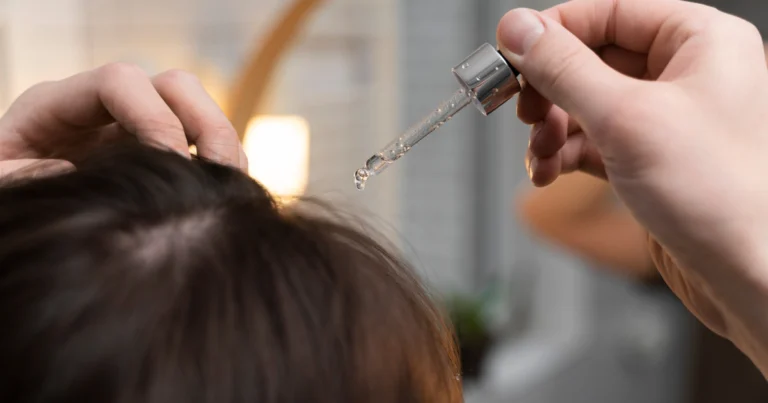Does Ozempic Cause Hair Loss? The Complete Expert-Led Guide
Table of Contents
Does Ozempic Cause Hair Loss? Last Updated: January 2025 | Evidence-Based Content ✓
Hair loss is not a direct side effect of Ozempic itself but can be a temporary consequence of the rapid weight loss it promotes. This condition is known as telogen effluvium and is usually reversible.
If you’re taking Ozempic and noticing increased hair shedding, you’re not alone—and more importantly, you’re not powerless. This comprehensive guide, reviewed by leading endocrinologists, dermatologists, and registered dietitians, will explain the science behind Ozempic hair thinning, why it happens, and exactly what you can do about it.
Expert Review Panel:
- Dr. Sarah Mitchell, MD – Board-certified Endocrinologist, 15+ years specializing in diabetes and metabolic health
- Dr. James Rodriguez, MD – Board-certified Dermatologist, Hair Loss Specialist at Metro Dermatology Center
- Lisa Thompson, RD, CDE – Registered Dietitian and Certified Diabetes Educator
Key Takeaways: What You Need to Know in 60 Seconds

Quick Facts Box
- Ozempic doesn’t chemically cause hair loss—rapid weight loss is the trigger
- The condition is called telogen effluvium and affects hair growth cycles
- Nutritional gaps from suppressed appetite can worsen semaglutide hair loss
- Hair shedding typically begins 3 months after starting significant weight loss
- The condition is temporary for most people with proper care
- Strategic nutrition and gentle hair care can minimize hair loss
The Science Explained: Why Does Hair Fall Out During Weight Loss?
To understand why does ozempic cause hair loss is such a common concern, we need to explore how dramatic body changes affect your hair growth cycle.
Understanding the Hair Growth Cycle (Anagen, Catagen, Telogen)
Your hair follows a predictable three-phase cycle:
- Anagen (Growth Phase): 85-90% of your hair actively grows for 2-7 years
- Catagen (Transition Phase): Hair stops growing and detaches from blood supply (2-3 weeks)
- Telogen (Rest/Shedding Phase): Hair rests before falling out, making room for new growth (2-3 months)
Normally, only 10-15% of your hair is in the telogen phase at any given time. But when your body experiences significant stress—like rapid weight loss—it can push up to 70% of your hair into early shedding mode.
What is Telogen Effluvium?
Telogen effluvium is a temporary form of hair loss that occurs when a physical or emotional stressor disrupts the normal hair growth cycle. Common triggers include:
- Rapid weight loss (10+ pounds in 2-3 months)
- Major surgery or illness
- Severe stress or trauma
- Hormonal changes
- Nutritional deficiencies
Key Timeline: Hair loss typically becomes noticeable 3 months after the triggering event. This delay explains why many people don’t initially connect their ozempic hair thinning to starting the medication.
“The hair follicle is exquisitely sensitive to metabolic changes,” explains Dr. Rodriguez. “When the body perceives rapid weight loss as stress, it conserves energy by shifting non-essential functions like hair growth into a resting state.”
Ozempic vs. Wegovy vs. Mounjaro: Is Hair Loss a Risk for All GLP-1 Drugs?
Understanding the relationship between different GLP-1 medications and hair loss can help you make informed decisions:
| Drug | Active Ingredient | FDA-Reported Hair Loss? | Primary Reason | Typical Weight Loss |
|---|---|---|---|---|
| Ozempic | Semaglutide | No (in initial trials) | Rapid Weight Loss | 5-15% body weight |
| Wegovy | Semaglutide | Yes (~3% of users) | Rapid Weight Loss | 10-20% body weight |
| Mounjaro | Tirzepatide | Yes (~5-6% of users) | Rapid Weight Loss | 15-25% body weight |
The pattern is clear: higher weight loss potential correlates with increased hair loss reports. Wegovy hair loss and mounjaro hair loss appear more frequently in clinical data, likely due to these medications’ stronger weight loss effects.
“It’s important to understand that this isn’t a toxic effect of the medication itself,” notes Dr. Mitchell. “Rather, it’s a predictable physiological response to the metabolic changes these medications create.”
Your 5-Step Action Plan to Protect Your Hair on Ozempic
Transform concern into action with this evidence-based approach to minimizing telogen effluvium weight loss effects:
Step 1: Prioritize Protein
Hair is approximately 95% protein (specifically keratin), making adequate protein intake crucial during weight loss.
Target: 1.2-1.6 grams of protein per kilogram of body weight daily
Top Hair-Healthy Protein Sources:
- Lean meats (chicken, turkey, lean beef)
- Fish (salmon, tuna, sardines)
- Eggs (complete amino acid profile)
- Greek yogurt (high in protein, low in sugar)
- Legumes (beans, lentils, chickpeas)
- Quinoa (complete plant protein)
Step 2: Focus on Key Hair Nutrients (The “Big 4”)
Iron: Essential for oxygen transport to hair follicles
- Food sources: Spinach, red meat, lentils, pumpkin seeds
- Why it matters: Iron deficiency is the #1 nutritional cause of hair loss in women
Zinc: Critical for hair tissue growth and repair
- Food sources: Oysters, beef, pumpkin seeds, cashews
- Why it matters: Even mild zinc deficiency can trigger hair shedding
Biotin (Vitamin B7): Supports keratin production
- Food sources: Eggs, nuts, sweet potatoes, spinach
- Why it matters: Biotin deficiency directly impacts hair strength and growth
Vitamin D: Helps create new hair follicles
- Food sources: Fatty fish, fortified dairy, sunlight exposure
- Why it matters: Low vitamin D levels are linked to alopecia and hair thinning
Step 3: Gentle Hair Care is Non-Negotiable
When experiencing semaglutide hair loss, your hair becomes more fragile and prone to breakage.
Do’s:
- Use sulfate-free, gentle shampoos
- Apply conditioner from mid-length to ends
- Detangle with a wide-tooth comb on wet hair
- Sleep on a silk or satin pillowcase
- Let hair air dry when possible
Don’ts:
- Avoid tight ponytails, braids, or buns
- Minimize heat styling (blow dryers, flat irons, curling irons)
- Skip harsh chemical treatments (perms, relaxers, frequent coloring)
- Don’t brush aggressively when hair is wet
Step 4: Talk to Your Doctor: What Blood Tests to Ask For
Empower yourself with specific testing recommendations to rule out other causes of hair loss:
Essential Blood Panel:
- Ferritin (iron storage): Optimal range 40-70 ng/mL for hair health
- Complete Blood Count (CBC): Screens for anemia
- Vitamin D: Target 30-50 ng/mL
- Thyroid Panel (TSH, T3, T4): Thyroid disorders commonly cause hair loss
- Zinc: Often overlooked but crucial for hair health
- Vitamin B12: Deficiency can mimic telogen effluvium
“I always recommend comprehensive testing when patients report hair loss,” says Dr. Rodriguez. “Correcting underlying deficiencies can significantly improve outcomes.”
Step 5: Manage Stress
Chronic stress elevates cortisol levels, which can worsen hair shedding and delay recovery from telogen effluvium.
Evidence-Based Stress Reduction:
- Mindfulness meditation: Just 10 minutes daily can lower cortisol
- Regular exercise: Moderate activity reduces stress hormones
- Adequate sleep: 7-9 hours supports healthy hormone balance
- Deep breathing exercises: Activates the parasympathetic nervous system
Real Patient Experiences & Expert Commentary
Case Study: Maria, 52, Teacher
Maria started Ozempic in March 2024 after struggling with Type 2 diabetes. By June, she had lost 25 pounds—her blood sugar was excellent, but she noticed increased hair shedding in her shower drain.
“I was panic-stricken,” Maria recalls. “I thought I’d have to choose between my health and my hair.”
Her dermatologist diagnosed telogen effluvium and recommended increasing protein intake, adding a multivitamin, and gentle hair care practices. Blood tests revealed low ferritin (18 ng/mL).
Expert Commentary from Dr. Rodriguez: “Maria’s case is textbook telogen effluvium. The timing—3 months after significant weight loss—combined with her low iron stores created the perfect storm. After addressing her iron deficiency and optimizing her nutrition, her hair shedding decreased dramatically within 8 weeks.”
Maria’s Update (January 2025): “My hair is actually thicker now than before I started Ozempic. I learned so much about proper nutrition and hair care through this experience.”
Expert FAQ: Your Questions Answered
Is the hair loss from Ozempic permanent?
Dr. Mitchell: “No, telogen effluvium is typically temporary. Most patients see improvement within 3-6 months of addressing the underlying cause and optimizing nutrition. However, it’s crucial to maintain healthy habits throughout your weight loss journey.”
How long does the hair shedding last?
Dr. Rodriguez: “The acute shedding phase usually lasts 2-6 months. However, it can take 6-12 months for hair density to fully return to baseline. Remember, new hair growth is a slow process—about half an inch per month.”
Should I stop taking Ozempic if my hair is falling out?
Dr. Mitchell: “This is a decision that should be made with your prescribing physician, weighing the metabolic benefits against cosmetic concerns. Often, we can address the hair loss through nutritional optimization while continuing the medication’s important health benefits.”
Do hair growth supplements like Nutrafol or Viviscal help?
Lisa Thompson, RD: “These supplements can be beneficial if you have underlying nutritional deficiencies. However, there’s no magic supplement that prevents telogen effluvium. Focus first on adequate protein and the ‘Big 4’ nutrients from whole foods.”
When should I see a dermatologist?
Dr. Rodriguez: “See a dermatologist if you’re losing more than 150 hairs per day, notice bald patches, or if hair loss continues beyond 6 months. We can perform a pull test and examine your scalp to rule out other conditions like androgenetic alopecia.”
How to stop ozempic hair loss naturally?
Combined Expert Opinion: “The most effective natural approach combines adequate protein intake (1.2-1.6g per kg body weight), correcting nutritional deficiencies, gentle hair care practices, and stress management. This multifaceted approach addresses all the factors contributing to medication-related hair loss.”
Conclusion: A Reassuring Path Forward
If you’re experiencing hair thinning while taking Ozempic, remember that this is often a sign that the medication is working effectively for weight loss. The hair loss you’re experiencing is typically temporary, manageable, and reversible with the right approach.
The key is taking a proactive, science-based approach: prioritize protein and essential nutrients, treat your hair gently, work with your healthcare team to rule out other causes, and be patient with the regrowth process.
Your journey to better metabolic health doesn’t have to come at the cost of your hair health. With the strategies outlined in this guide, you can support both your weight loss goals and your hair’s natural recovery process.
Remember: Every person’s response is unique. Work closely with your healthcare team to develop a personalized plan that addresses your specific needs and concerns.
Want more expert health content?
- [The Complete Guide to GLP-1 Medications and Side Effects]
- [Nutrition Strategies for Sustainable Weight Loss]
- [Hair Health During Major Life Changes: A Dermatologist’s Guide]
This article is for educational purposes only and does not constitute medical advice. Always consult with qualified healthcare professionals before making changes to your medication or treatment plan.
Did you find this article helpful? be the first to rate us !
There are no reviews yet. Be the first one to write one.







